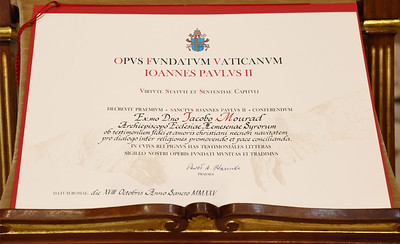His Eminence Cardinal Kurt Koch, Prefect of the Pontifical Council for Promoting Christian Unity and President of the Jury of the Saint John Paul II Award, Reverend Monsignor Pawel Ptasznik, President of the Vatican Foundation of John Paul II, Your Excellencies, dear brothers and sisters in the priesthood, religious men and women, Dear brothers and sisters, members and friends of the Foundation, and friends from Italy, Germany, and the Middle East.
First of all, I would like to express my gratitude and sincere appreciation for the organization of this extraordinary event, and to thank, through you, His Holiness Pope Leo XIV.
Thank you for your fidelity to the spirit of the founder, and thank you also for this award, which is a new motivation for our mission in the service of the Church and evangelization. This recognition by the Universal Church is intended for the spiritual, social, and intellectual work carried out by the Church in Syria, in all its components. It is the Church that, during difficult years, has led a noble struggle in favour of human dignity throughout Syria. I would like to make special mention of the young people who have worked in the humanitarian field alongside bishops, priests, monks, and nuns. I receive this award on behalf of all these people.
In addition to its personal value, I believe that this award has a communal and ecclesial dimension. It is, in fact, an award dedicated to the Church in Syria. It also constitutes an important sign for ecumenical relations and interreligious dialogue. This choice reflects the journey of the Church in Syria over the centuries, a journey marked by a deep commitment to dialogue with Muslims, a commitment rooted in the teaching of Jesus.
From its origins, the Christian community in Syria has understood its mission: to be a living witness to the message of salvation. It has recognized that it is called to live love, forgiveness, and the pursuit of goodness. All this translates into an unconditional embrace, righteousness in daily work, and sincere openness to diversity.
We are aware of the Christian origins of many Muslims, who embraced Islam for various reasons that we will not explore here. This awareness invites us to renew our gaze and rediscover the bonds that unite us, recognizing Muslims not as strangers, but as brothers and sisters in faith in the one true God (Jn 17:3) and companions on the journey towards truth and peace.
Today more than ever, in Syria, Christians and Muslims are called to recognize and improve the bonds that unite us. Our religious traditions share a belief in the sacredness of life and the dignity of the human person. Together with all men and women of good will, we aspire for peace. I wish to emphasize strongly that the theological research and the interreligious/ intercultural dialogue are not optional, but a vital necessity for our time, especially for Syria, which is still wounded by war.
Located in the center of the Levant, Syria plays a fundamental role in the history, culture, and life of the entire region. Similarly, the city of Homs, Emaesa, located in the heart of Syria, represents the greatest Christian diversity in the territory and is a vital center for the social, cultural, and religious life of the country. Both of these places are not only central from a geographical point of view, but also symbolically essential for understanding the identity, history, and hope of this land.
At this moment, I cannot help but think of the symbolic city located five hundred kilometres from us: Jerusalem, Al-Quds, which continues to cry out in pain in the face of injustice and illogical and unacceptable violence. Jesus traced the way of the cross and took upon himself the sufferings of the world. With his sacrifice, he paid the price for the sins of humanity, rendering salvation to all.
In the Middle East, for years we have been carrying the cross of pain, war, death, and destruction. We carry the cross of poverty, hunger, destitution, and the pain of being deprived of fundamental rights — first and foremost, the right to a secure homeland that guarantees freedom and equality for all its citizens. Today, unfortunately, many of us feel like strangers in our own country because of religious, political, and ethnic conflicts fuelled by the great powers, which I hold directly responsible for what is happening in the region. The lack of a positive and optimistic outlook on the future drives many people to emigrate in search of a place where they can live with dignity and, above all, in safety.
After years of suffering, Syria is taking very tentative steps towards real change. It needs solidarity and concrete support, not just a share in resources or attaining superficial agreements. More so, it needs to move strongly towards a future of reconciliation and democracy. On this journey, the Universal Church, inspired by the example and charisma of Pope John Paul II, can play a significant role, accompanying communities and encouraging the path towards freedom, justice, and social cohesion.

Yet we are a people of faith, and therefore a people of hope: this is our witness to the world. We want our persevering hope to be a call to renew the international commitment to building authentic peace.
I give thanks to God for his Church, which through its mission continues to fight every form of injustice and evil, becoming the sign par excellence of Christian hope. I thank the Universal Church, in the person of Pope Leo XIV, and the foundation of Pope John Paul II for their constant commitment to promoting initiatives of dialogue and reconciliation in the service of peace.
† Mons. Youlian Jacques Mourad, Speech by Monsignor Jacques Mourad Archbishop of Homs, Hama, and Neck for Syriac Catholics
